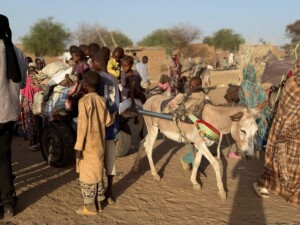Beja Council to resume protests against eastern Sudan peace protocol
The eastern Sudanese High Council of Beja Nazirs and Independent Chieftains will stage a protest vigil on Sunday unless the federal government will agree with their demand to cancel the Eastern Sudan Track which is part of the Juba Peace Agreement, signed in the South Sudanese capital on October 3 last year.
 South Sudanese peace negotiator Tut Galuak (File photo)
South Sudanese peace negotiator Tut Galuak (File photo)
The eastern Sudanese High Council of Beja Nazirs and Independent Chieftains will stage a protest vigil on Sunday unless the federal government will agree with their demand to cancel the Eastern Sudan Track which is part of the Juba Peace Agreement, signed in the South Sudanese capital on October 3 last year.
Abdallah Obshar, spokesman for the Beja Nazirs, announced in a press conference in Port Sudan yesterday that committees have been formed to prepare the protest sit-in.
He said that rumours about the council's agreement to participate in an all-inclusive Eastern Sudan conference are baseless. “Any attempt to circumvent our demands will be rejected.”
The eastern Sudan High Native Administration Council yesterday affirmed its adherence to “the immediate implementation of the Eastern Sudan Track”.
Spokesperson Mohamed Ahmed Osman said that they have forwarded their standpoint to Tut Galuak, the head of the South Sudanese peace mediation team that is currently visiting Sudan for a follow-up of the implementation of the Juba Peace Agreement.
Osman welcomed the proposal of a consultative conference for the eastern Sudanese people about the implementation of the Eastern Sudan Track.
The head of the South Sudanese mediation team for the Juba Peace Agreement, Tut Galuak, said in a press conference yesterday that the mediation delegation agreed that Gen Mohamed ‘Hemeti’ Dagalo, Commander of the Rapid Support Forces and Vice President of the Sovereignty Council will head the negotiation committee tasked with reaching an agreement with the Beja Nazirs.
In addition, a comprehensive conference will be held for the eastern Sudanese with the aim of resolving “all outstanding issues facing the nation after the completion of the signing process”.
Galuak added that the South Sudanese delegation will return to Sudan after two weeks “to continue negotiations with the people of the east to reach a peace that fulfils all the hopes and aspirations of the Sudanese”.
Rejected from the start
The Beja nazirs have opposed the Eastern Sudan Track since it was first agreed upon by the Sudanese government and the Sudan Revolutionary Front rebel alliance in the South Sudan capital of Juba in February 2020.
The protocol was negotiated by members of the Beja Congress in Opposition and the Popular Front for Justice. The Beja Nazirs Council was not involved.
The Beja leaders’ council, headed by Nazir Sayed Tirik, reacted at the time by calling for an inclusive eastern Sudan conference to decide on the future of the region. The council organised two large protest events last year, in Sinkat in Red Sea state and in Telkok in Kassala, where they threatened they would demand the right to self-determination for eastern Sudan if the government would not comply to their demands.
In September, the Beja Nazirs escalated their protests, and closed a number of ports and roads in Red Sea state, including the Port Sudan-Khartoum highway to put pressure on their demands.
Five days after the military coup on October 25, the Beja nazirs suspended their protest actions for one month “in order to allow the formation of a new government”.
In September, the spokesperson already expressed their lack of confidence in the Sudanese cabinet. “We demand a competent government [of technocrats] as the current partisan government is too slow in responding to our demands,” Obshar said. The Beja as well fear that the rich resources in the east will continue to be exploited by foreign companies.
‘Broad powers’
On Wednesday, the Sudanese government and the parties to the peace process signed an appendix to the Northern Sudan and Central Sudan tracks of the Juba Peace Agreement.
The new deal concerns power and wealth sharing between the federal government and the five Sudanese regions (Darfur, Northern Sudan, Central Sudan, Southern Sudan, and Eastern Sudan as stipulated in the Juba Peace Agreement) and the creation of regional governments with broad powers.











 and then
and then